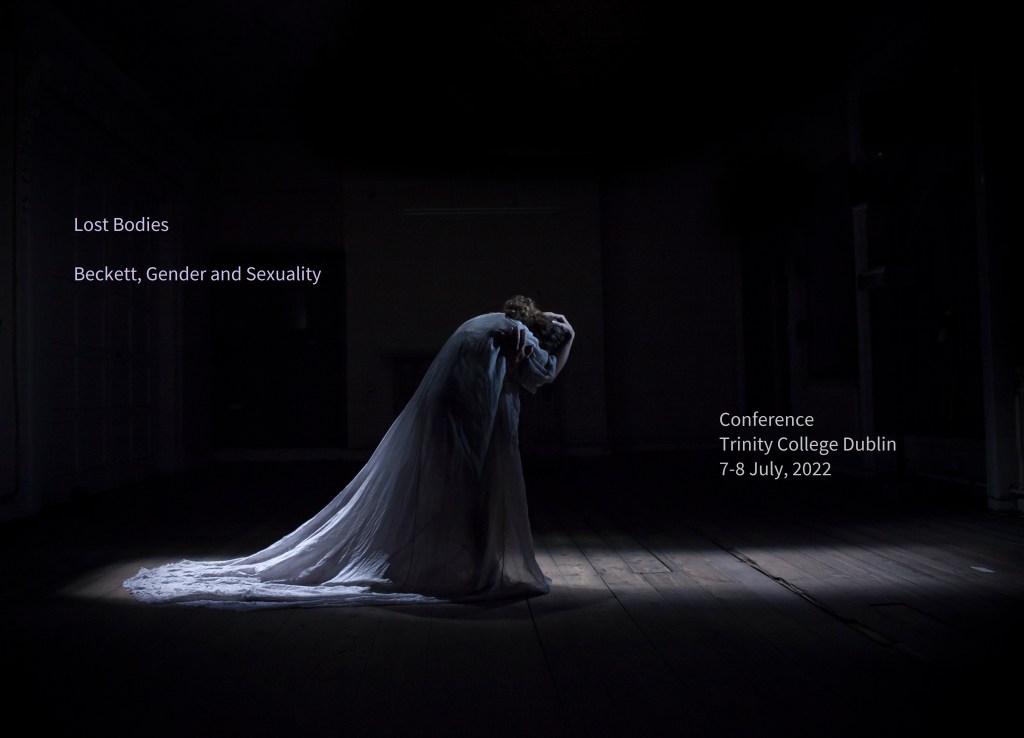
A call for papers has been announced by the organisers of ‘LOST BODIES: Beckett, Gender and Sexuality’ a conference to be held in Trinity College Dublin on July 7-8, 2022. The enforced cancelation of the Beckett Society’s 2020 annual conference scheduled for Bordeaux, titled “‘Stepping down into the sexpit’: Sex and Gender in Samuel Beckett’s Work’ disappointed many within Beckett scholarship as it deprived all of the chance to fully engage with an area which has remained so under-researched heretofore.
The full cfp reads as follows:
LOST BODIES: BECKETT, GENDER AND SEXUALITY
Trinity College Dublin, 7-8 July 2022
‘Abode where lost bodies roam each searching for its lost one’
– ‘The Lost Ones’ (1970)
In 1993, Mary Bryden published Women in Samuel Beckett’s Prose and Drama: Her Own Other. Bryden was one of the first scholars to discuss gender and sexuality in Samuel Beckett’s work, noting that while his early fiction is ‘consistently secure in its deference to sexual polarities […] as the dramatic and the later prose work proceed, however, there is to be found not just a slow but persistent hacking away at the notion of gender as predictor of an array of essentialist components, but also a renewed commitment of the dynamic of dispossession’ (14). In his 2004 essay, ‘Beckett and Homoeroticism’, Peter Boxall suggests that ‘in what could be thought of as an extraordinary demonstration of mass denial, Beckett studies has worked under the assumption that Vladimir and Estragon are just friends. Like Holmes and Watson, they may have breakfast together, but in the critical imagination they have remained resolutely straight’ (110). Notwithstanding the volume of research published on Beckett in the intervening years, Boxall’s point still stands.
The representation of women in Beckett’s work also continues to present a challenge to Beckett studies. The portrayal of fictional and semi-monstrous maternal figures is a central but often ambiguous concern of Beckett’s early to mid-period prose works. Here, the fear and hatred often displayed towards the mother figure or potentially pregnant female character powerfully demonstrates what Julia Kristeva terms a fear of the ‘archaic mother’ or essentially a fear of ‘her generative power’ (77). This phase of Beckett’s writing features a prevailing misogyny. In Beckett’s dramatic output, older women become a more central concern, yet insufficient critical attention has so far been paid to how their embodied experiences, their desires, longings and remonstrations are depicted.
There are many instances in Beckett’s writing that play on the denial of sexual difference. The boundaries between men and women, homosexuality and heterosexuality are often porous (Roof) and this calls into question notions of identity built on sexual orientation (Stewart). With this in mind, we would like to take stock of the contributions of gender, queer, trans and sexuality studies in the field of Beckett studies. What do they reveal about Beckettian aesthetics and ethics? Which textual politics are revealed? How are gender and sexuality problematized today on the world stage when Beckett texts are adapted?
The 2020 Samuel Beckett Society annual conference, “‘Stepping down into the sexpit’: Sex and Gender in Samuel Beckett’s Work’, which was to be held in Bordeaux before the intervention of the pandemic, planned to address the issues raised by these questions. By drawing on the preliminary work done for that event, and on the forthcoming Samuel Beckett Today/Aujourd’hui volume it inspired, this conference now aims to engage more overtly with what remains ‘insufferable’ about gender and sexuality in Beckett’s work, as Daniela Casseli has put it (London Beckett Seminar, 2018). It will confront the polite silence that has persistently surrounded these issues to date. We invite contributions that draw on gender, queer, trans and sexuality studies and bring these ideas to bear on Beckett’s writing. How are women and men represented? How does this representation change over the course of his work? How are ageing women represented in Beckett’s drama and in performance? Why are female characters more confined by stage directions than their male counterparts? Can pseudocouples be queer couples? Can Beckett’s resistance to the social normal be read in queer terms?
Topics for papers may include, but are not limited to:
Beckett and femininity/masculinity
Queer and trans imaginative worlds
Sex, gender and laughter/trauma
The politics of motherhood/fatherhood
Ageing and the feminine
Beckett and misogyny
Women and Beckett in performance
Disability and the Body
Gender restrictions in performance
The sexual encounter and the sex act in Beckett’s writing
We invite abstracts of 200 words, and a short bio (100 words) to sbconference2022@gmail.com by 25 March 2022. All presentations will be 15 minutes long.
Julie Bates, Trinity College Dublin
Brenda O’Connell, Maynooth University
Pascale Sardin, Université Bordeaux-Montaigne
Feargal Whelan, Trinity College Dublin
Works Cited
Boxall, Peter, “Beckett and Homoeroticism”. in Oppenheim, Lois (ed.). Palgrave Advances in Beckett studies. Basingstoke & New York: Palgrave, pp. 110-132, 2004.
Bryden, Mary, Women in Samuel Beckett’s Prose and Drama: Her Own Other. Houndsmill: Macmillan, 1993.
Caselli, Daniela, “Insufferable: Gender and Sexuality in the Work of Samuel Beckett”. London Beckett Seminar, 9 March 2018.
Kristeva, Julia, Powers of Horror: An Essay on Abjection, trans. Leon S. Roudiez, New York: Columbia University Press, 1982.
Roof, Judith, “Is There Sex after Gender? Ungendering/The Unnamable”, The Journal of the Midwest Modern Language Association. Vol. 35, No. 1 (Spring, 2002), pp. 50-67.
Stewart, Paul, Sex and Aesthetics in Samuel Beckett’s Work, New York: Palgrave Macmillan, 2011.

